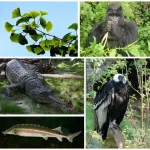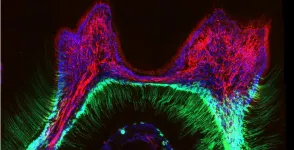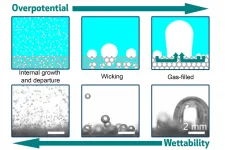Functional consequences of global biodiversity loss guide future nature conservation
2021-03-26
(Press-News.org) One million species are under threat of extinction worldwide, primarily due to adverse human impact. The loss of a species is an ethical tragedy, but additionally, it can have dramatic effects on the functioning of ecosystems on Earth. In each ecosystem, species have their roles, just like actors do in a play. These roles depend on the characteristics of the species, like their size, weight, shape, reproductive capacity, or the food resources they use. If some species are similar, they can sometimes substitute each other and keep the ecosystem going even if one of them is lost. However, the accumulated loss of many species can lead to ecosystem degradation with a direct adverse effect on human well-being.
There are so many different species of various kinds that it is extremely difficult to generalize the global functional variation and understand the functional consequences of biodiversity loss. A research group from the University of Tartu took the challenge and compiled data on characteristics of more than 75,000 species of plants, mammals, birds, amphibians, reptiles, and freshwater fish. The unprecedented global summary of organisms' functions was just published in Science Advances.
All species were projected onto a so-called functional space - a mathematical abstraction of their form and function. In this functional space, similar species are located close to each other, and dissimilar species are far. Overall, the functional space has some "regions" with plenty of species and others with just a few. The leading author, Dr Carlos P. Carmona, notes, "A very interesting result that we found is that, in all these groups, more than half of the species are responsible for less than 20% of the functions performed by the group, therefore implying that 80% of the remaining functions are performed by few species which are functionally unique."
Some particular functions performed by a taxonomic group, such as plants, mammals or freshwater fish, may be shared among many species or only supported by a few species. For example, on a global scale, there are many species of grasses that have similar features and perform similar functions, but there are not many species with the features of a redwood. In the case of functions performed by many species, it is unlikely that the extinction of some of these species will strongly affect the functions of the whole group. On the contrary, if certain functions are performed by only one or a few species, their disappearance will lead to a reduction in the range of functions performed by the entire group.
The research group also explored how much we can lose from the functional space if these one million threatened species do go extinct. Dr Carmona continues, "We wanted to explore how extinctions will affect the functioning of different groups of organisms. We found that large, long-lived, and low-fertility species are universally more likely to be threatened. This is bad news because we know that the largest plants and animals play a hugely important role in functions such as soil fertility, seed dispersion or carbon storage. Their extinction would therefore cause an overall reorganization of the range of functions performed."
Since many species can substitute each other's roles, the functional decline would be up to 5%, with the most dramatic losses happening to freshwater fish. This percentage is lower than the potential loss of species numbers. Still, it can have a major influence on the ecosystem services to humans, like clean air and water, soil fertility, our own food, medicines, building material, or good physical and mental health. In addition, a very large part of the functional space will rely on a much lower number of species, and possible subsequent biodiversity loss will already have a much more dramatic effect.
Dr Carmona also has a clear suggestion to nature conservation authorities: "We propose that species providing unique trait combinations should have a top conservation priority because losing them would imply the complete disappearance of their functions from Earth."
INFORMATION:
[Attachments] See images for this press release:

ELSE PRESS RELEASES FROM THIS DATE:
2021-03-26
For people with tooth decay, drinking a cold beverage can be agony.
"It's a unique kind of pain," says David Clapham, vice president and chief scientific officer of the Howard Hughes Medical Institute (HHMI). "It's just excruciating."
Now, he and an international team of scientists have figured out how teeth sense the cold and pinpointed the molecular and cellular players involved. In both mice and humans, tooth cells called odontoblasts contain cold-sensitive proteins that detect temperature drops, the team reports March 26, 2021, in the journal Science Advances. Signals from these cells can ultimately trigger a jolt of pain to the brain.
The work offers an explanation for how one ...
2021-03-26
Because of their interactions and conflicts with the major contemporaneous civilizations of Eurasia, the Scythians enjoy a legendary status in historiography and popular culture. The Scythians had major influences on the cultures of their powerful neighbors, spreading new technologies such as saddles and other improvements for horse riding. The ancient Greek, Roman, Persian and Chinese empires all left a multitude of sources describing, from their perspectives, the customs and practices of the feared horse warriors that came from the interior lands of Eurasia.
Still, despite evidence from external sources, little is known about Scythian history. Without a written ...
2021-03-26
'A persistent and troubling rural disadvantage'
Strategies needed to support rural Americans
CHICAGO ---Heart failure deaths are persistently higher in rural areas of the United States compared with urban areas, reports a new Northwestern Medicine study. The research also showed race disparities in heart failure are prevalent in rural and urban areas with greatest increases among Black adults under 65 years old.
Heart failure deaths have been increasing nationally since 2011, but there is significant geographic variation in these patterns based on race.
"This work demonstrates a persistent and troubling rural disadvantage with significantly higher rates of death in rural areas compared with urban areas," said lead study author Dr. Sadiya ...
2021-03-26
University of Maryland School of Medicine (UMSOM) researchers have identified the most toxic proteins made by SARS-COV-2--the virus that causes COVID-19 - and then used an FDA-approved cancer drug to blunt the viral protein's detrimental effects. In their experiments in fruit flies and human cell lines, the team discovered the cell process that the virus hijacks, illuminating new potential candidate drugs that could be tested for treating severe COVID-19 disease patients. Their findings were published in two studies simultaneously on March XX in Cell & Bioscience, a Springer Nature journal.
"Our work suggests there is a way to prevent SARS-COV-2 from injuring the body's tissues and doing extensive damage," says senior author of ...
2021-03-26
Using electricity to split water into hydrogen and oxygen can be an effective way to produce clean-burning hydrogen fuel, with further benefits if that electricity is generated from renewable energy sources. But as water-splitting technologies improve, often using porous electrode materials to provide greater surface areas for electrochemical reactions, their efficiency is often limited by the formation of bubbles that can block or clog the reactive surfaces.
Now, a study at MIT has for the first time analyzed and quantified how bubbles form on these porous electrodes. The researchers have found that there are three different ways bubbles can form on and depart from the surface, and that these can be precisely controlled ...
2021-03-26
Limerick, Ireland, 26 March 2020: Researchers at Lero, the Science Foundation Ireland Research Centre for Software and University of Limerick (UL), have found video gamers can significantly improve their esport skills by training for just 10 minutes a day.
The research team at Lero's Esports Science Research Lab (ESRL) at UL also found novice gamers benefited most when they wore a custom headset delivering transcranial Direct Current Stimulation (tDCS) for 20 minutes before training sessions.
Dr Mark Campbell, director of Lero's Esports Science Research Lab (ESRL) and senior lecturer in sports psychology at UL, said their work showed that neurostimulation could accelerate motor performance improvements specifically in novice esports ...
2021-03-26
Patients with lupus are more likely to have metabolic syndrome and insulin resistance - both factors linked to heart disease - if they have lower vitamin D levels, a new study reveals.
Researchers believe that boosting vitamin D levels may improve control of these cardiovascular risk factors, as well as improving long-term outcomes for patients with systemic lupus erythematosus (SLE).
Given that photosensitivity is a key feature of SLE, the scientists say that a combination of avoiding the sun, using high-factor sunblock and living in more northerly ...
2021-03-26
What The Study Did: Insurance claims were used to assess patterns of telehealth use across surgical specialties before and during the COVID-19 pandemic.
Authors: Grace F.Chao, M.D., M.Sc., of the National Clinician Scholars Program at the University of Michigan and Veterans Affairs Ann Arbor in Michigan, is the corresponding author.
To access the embargoed study: Visit our For The Media website at this link https://media.jamanetwork.com/
(doi:10.1001/jamasurg.2021.0979)
Editor's Note: The article includes conflict of interest and funding/support disclosures. Please see the article for additional information, including other authors, author contributions ...
2021-03-26
What The Study Did: This article discusses possible pathogenic mechanisms of brain dysfunction in patients with COVID-19.
Authors: Maura Boldrini, M.D., Ph.D., of the New York State Psychiatric Institute, Columbia University Irving Medical Center in New York, is the corresponding author.
To access the embargoed study: Visit our For The Media website at this link https://media.jamanetwork.com/
(doi:10.1001/jamapsychiatry.2021.0500)
Editor's Note: The article includes conflict of interest disclosures. Please see the article for additional information, including other authors, author contributions and affiliations, conflict of interest and financial ...
2021-03-26
Bariatric surgery can significantly reduce the risk of cancer--and especially obesity-related cancers--by as much as half in certain individuals, according to a study by researchers at Rutgers Robert Wood Johnson Medical School's Center for Liver Diseases and Liver Masses.
The research, published in the journal Gastroenterology, is the first to show bariatric surgery significantly decreases the risk of cancer in individuals with severe obesity and nonalcoholic fatty liver disease (NAFLD). The risk reduction is even more pronounced in individuals with NAFLD-cirrhosis, the researchers say.
"We knew that obesity leads to certain problems, including cancer, but no one ...
LAST 30 PRESS RELEASES:
[Press-News.org] Functional consequences of global biodiversity loss guide future nature conservation





